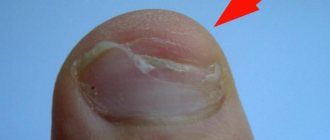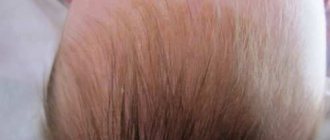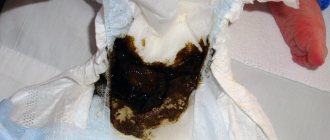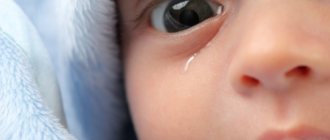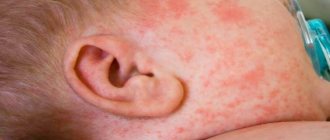Causes
Normally, a healthy person's ears should not smell. If there is even a slight odor, this indicates an imbalance in the body or some kind of disease.
- Metabolic disease . It is directly related to changes in thyroid function. Violations can also occur due to lack of a balanced diet or poor lifestyle. For example, fasting or overeating, a sedentary lifestyle.
- Adolescence can trigger the appearance of odor, as hormonal changes in the body .
- Fungal diseases caused by staphylococcus, streptococcus. The causes of this disease can be bruises and disruption of the ear microflora. The disease is easy to recognize; a person experiences itching, pain, swelling, decreased hearing, plaque or discharge from the ear, and high fever. If such serious symptoms occur, you should immediately contact a specialist. After all, it is quite difficult to cure bacteria such as staphylococcus.
- Myringitis is an inflammation of the eardrum, which is accompanied by significant hearing loss. This disease can be caused by complications from the flu, as well as injury to the outer ear. As the disease develops, blisters filled with fluid form. When treated, they burst and fluid is released into the outer ear area, which causes an unpleasant smell of rot. When myringitis occurs, a person experiences shooting pains, discharge from the ear canal, and a slight decrease in hearing. In any case, if you suspect such a disease, you should contact an otolaryngologist, since only he will be able to examine the integrity of the eardrum and prescribe the right solution.
- Earwax occurs when earwax accumulates in large quantities in the ear canal. This leads to the spread of bacteria and unpleasant odors.
- Colds of the ears. When they form boils, which burst during the process of ripening and pus is released, which gives an unpleasant rotten smell.
- Otitis externa and otitis media can cause odor. Children under 10 years of age are more often susceptible to otitis, since their ear structure is different from that of adults, and bacteria easily enter there. Lingering inside the ear, under the influence of heat they begin to multiply intensively, which leads to inflammation. It is accompanied by severe pain in the ear and increased temperature. In this case, you should definitely contact an otolaryngologist to make an accurate diagnosis and prescribe treatment.
When medical attention is needed
If, despite the preventive measures taken, the baby’s ear smells bad, we can talk about the development of a pathological process. In this case, you should contact a pediatrician or otolaryngologist to determine the exact cause of the disorder and take the necessary measures.
Important! Due to the peculiarities of the anatomy of the hearing organs, young children very quickly develop dangerous complications, leading to serious consequences, including deafness and death. Self-medication or uncontrolled use of medications without a doctor’s prescription is unacceptable.
If you experience pain or discharge from the ear, seek immediate medical attention.
Immediate medical attention is required in the following cases:
- Pain syndrome. To confirm the presence of pain and discomfort, you need to press on the tragus, which is a small protruding cartilage next to the auricle on the side of the cheek. The manipulation should be carried out on both sides. As the pathology develops, the baby begins to cry and worry.
- A sharp deterioration in health and the addition of other symptoms. Increased temperature, apathy, nausea, vomiting, diarrhea, poor coordination of movements, and convulsions indicate an acute infection. In the absence of timely treatment, severe complications can develop, including sepsis and cerebral edema.
- The appearance of purulent, bloody or mucous discharge from the ear canal. The appearance of fluid may indicate a ruptured eardrum. Before the doctor arrives, it is prohibited to use any drops or rinse the ear, as this will lead to damage to the auditory nerve and deafness.
- Skin rashes and itching of unknown etiology. This can be a symptom not only of dermatitis or allergies, but also of many infectious diseases.
- A foreign object or wax plug in the ear canal. Do not attempt to remove a foreign body using tweezers, cotton swabs, or rinsing with water and hydrogen peroxide. If you can’t remove it with your fingers, you can lay the baby on its side; sometimes small objects fall out on their own.
In a baby
The origin of odor from a baby’s ear can be different. Most often, the appearance of odor is not associated specifically with the organ of hearing. However, it also happens that an inflammatory process occurs.
- Lack of baby ear care. Perhaps the most common occurrence. Pediatricians warn young parents that they should clean their children’s ears carefully and without using cotton swabs or other objects. As a result, many young mothers are simply afraid of harming their baby, and therefore ignore ear cleaning or simply refuse it.
- The presence of fluid in the child's ears . If this happens during bathing, then, as a rule, there is no smell. However, there are times when breast milk or formula gets into the baby's ears through regurgitation. This happens due to improper attachment of the baby to the breast, as well as when the baby is constantly in a horizontal position. When this situation occurs, a sour smell of milk is felt from the ear. In order to get rid of it, it is necessary to normalize breastfeeding and remember to carry the baby in an upright position until belching occurs.
- Smell from sweat . Breasts sweat often. Moreover, this happens not only due to overheating, but also when eating. Sweat accumulates in the folds of the newborn, as well as behind the ears, and therefore an unpleasant odor occurs.
- The presence of a foreign body in the ear canal. A foreign body makes it difficult for the wax to pass away and a plug may form. As a rule, in such a situation there will be not only an unpleasant odor from the ear, but also anxiety for the baby due to discomfort and the development of infection. It is difficult to determine this, since the baby is still small and will not be able to inform his parents about this.
- Ear diseases . This could be otitis media or external, various fungal diseases of the ear canal. The newborn's immunity is still in its development stage. Therefore, any viruses and bacteria easily enter the body through the nasopharynx, causing inflammation of the middle ear. Fungal infection in babies is most often caused by candidiasis and is visible to the naked eye. Looking into the ear canal you can see redness, swelling, and a yellow coating. At the same time, the baby may have a fever, he will be lethargic, and he may also constantly touch and rub his ears.
- An unpleasant odor may appear due to poor nutrition , namely a lack of vitamins A and B.
- Allergic reactions . It is very common for newborns to have food allergies. In this case, crusts form throughout the body, and they can also appear behind the ears. Such formations become wet and an unpleasant odor appears. To avoid them, you need to choose the right formula, and if you are breastfeeding, then follow a diet.
Having examined the causes of unpleasant odor in newborns, we can conclude that you can get rid of it at home simply by following the feeding rules and carrying out hygiene procedures in a timely manner. However, if you suspect a disease of the ear canal, you should consult a specialist. Since incorrect or lack of treatment for otitis and fungal infections can lead to serious consequences, such as deterioration or loss of hearing.
Ways to solve the problem
Let's consider what to do if a child has an unpleasant odor from the ears due to external factors. Usually this phenomenon is short-term in nature and disappears without a trace if the listed recommendations are followed.
Carrying out hygiene measures
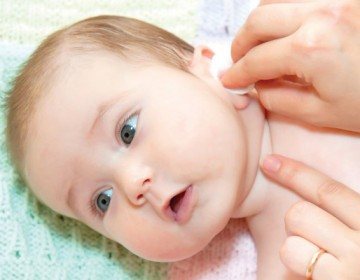
Ears should be cleaned regularly
First of all, it is necessary to sanitize the outer part of the ears and the skin around the ears. To do this, use a cotton pad or swab moistened with boiled water. In case of severe contamination, visible to the naked eye, you can clean the ear canals using cotton wool. It is not allowed to insert them deeper than 0.5 cm. For children older than 3-4 months, it is allowed to use cotton swabs with a limiter.
Hygienic procedures should be carried out at least 2 times a week. After each bath, it is necessary to thoroughly dry the baby's ears to prevent possible water from flowing into the ear canal.
Prevention of allergies and regurgitation
To prevent unpleasant odor from the ears of a baby, the following recommendations must be followed:
- correctly attach the baby to the chest, making sure that his head is higher than his body;
- after breastfeeding or formula feeding, carry the baby in an upright position for at least 10 minutes to effectively remove gases from the stomach;
- select an artificial formula in accordance with the pediatrician’s recommendations and the individual characteristics of the baby;
- put the baby to sleep on a hard orthopedic mattress without a pillow;
- dress the baby according to the weather, avoid overheating;
- carefully introduce new foods into the diet of a nursing mother and child; if signs of intolerance appear (itchy skin rashes, intestinal upset), exclude the allergen from the menu;
- Use only hypoallergenic baby hygiene products, cosmetics and washing powders.
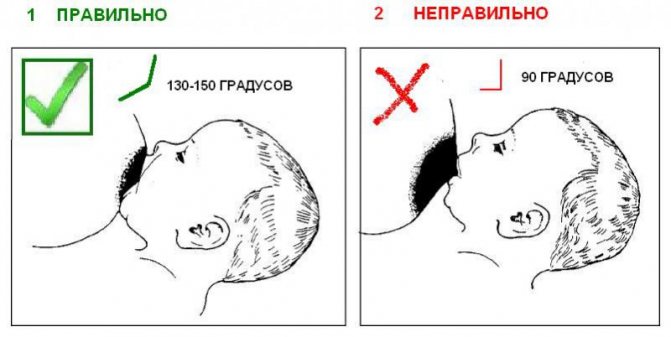
It is very important to put your baby to the breast correctly when feeding
In older children
As a rule, the culprit of unpleasant ear odor in older children can be the same as in babies, but there are also some peculiarities.
- An unbalanced diet leads to a lack of vitamins - this can cause an unpleasant odor. Many older children begin to neglect sweets, fast food, soda, chips and other unhealthy foods.
- Lack of hygienic measures for cleaning ears. When parents lose control of their children, they simply forget to clean their ears.
- infections can occur in older children.
- Colds with the appearance of purulent pimples.
- Age-related features in which the secretion glands malfunction. This phenomenon provokes an increase in the amount of earwax, which causes the odor.
Unpleasant odor from a child’s ear: causes and solutions
Some parents notice odor from their child's ear from time to time.
Such a manifestation can be completely harmless and go away on its own, but sometimes the cause is external influences on the body or processes outside the hearing organs.
You should be wary if you have concerns about the development of inflammation. In this case, immediate medical consultation will help avoid many negative consequences.
External factors
In some cases, especially in young children, an unpleasant odor may occur for reasons that are not directly related to the hearing organs. They can be one-time in nature or arise due to changes occurring in the body.
External reasons that cause an unpleasant odor from the ear in a child are:
- fluid getting into the ear;
- prickly heat;
- allergy;
- hormonal changes.
The first factor does not always mean that it was water that got deep into the ear. Infants may have a sour, foul odor due to vomit.
While lying down, the baby regurgitates food and some of this mass spreads over the cheeks and accumulates near the ear. If you have such a problem, you need to take care of choosing a diet that will reduce the likelihood of frequent regurgitation.
You also need to hold your baby upright after eating. The baby should be put to sleep on a diaper, not on a pillow.
Another reason is prickly heat. It manifests itself as redness in places where there are skin folds, including behind the ears. Caused by overheating and rotting of the body. If there is a rash and itching, it may be diathesis or dermatitis. Such allergies to various substances cause odor due to the formation of weeping areas and crusts.
At a younger age, also during adolescence, increased odor may be a consequence of hormonal changes. After the process is completed, this phenomenon will disappear by itself.
In addition to the above-mentioned reasons, other factors that are directly related to the processes occurring inside the hearing organs can also provoke a specific smell. These include:
- blockage of the passage by a foreign object;
- accumulation of sulfur;
- infection.
When the ear canal is blocked, the evacuation of contaminants becomes more difficult. Also, when tissue is damaged, the risk of inflammation increases. A foreign object can be a source of infection, including fungal infection.
When sulfur accumulates in large quantities, especially if a lot of time has passed since the previous cleaning, it also acquires an unpleasant odor.
Infection can enter a child's ear in different ways. Most often this occurs in the presence of a cold and inflammation of the nasopharynx. Due to the specific anatomical structure of the Eustachian tube at an early age, harmful microorganisms easily penetrate the middle ear and provoke otitis media.
That is why such diseases are often complications of a cold, flu, sore throat or a common runny nose. In addition, bacteria can be introduced into the outer ear during hygiene procedures. You should use clean ear sticks with stops and do not go deeper than is allowed.
If there is a problem, the child’s ear smells mainly of fish, rot, or something sour. Fungal bacteria, staphylococcus, hemophilus influenzae and other microorganisms have a specific manifestation, which makes diagnosis easier.
Also pay attention to the presence of discharge. Purulent impurities indicate the destructive effect of bacteria on tissue. Bloody spots may be a sign of a serious pathology or ear injury.
But the release of fluid and the detection of plaque on the ears is a sure symptom of otomycosis.
Solutions to the problem
Depending on what causes your child to have a specific ear odor, treatment for this symptom may vary dramatically. First, we should consider more common and relatively harmless situations associated with external influences.
If vomit gets into the ear, it is necessary to establish the principle of feeding the baby. You need to hold the baby in your arms, but not place it strictly in a horizontal position. After finishing feeding, hold him in the posture position and lightly pat him on the back. The baby will vomit air and food particles. After this, you can put him in his crib.
If skin redness and rash are detected, allergies or heat rash should be suspected. Be sure to provide air access to the skin of the ears. To prevent rotting, powder and special ointments are used.
Herbal decoctions, such as chamomile, sage or string, are also used to relieve swelling. Eliminate your baby's contact with allergens and adjust his diet.
Nursing mothers need to pay attention to their menu.
Any actions must be coordinated with the pediatrician, since inexperienced parents can harm the child by self-medicating.
If the smell is unpleasant enough to suspect suppuration, a visit to an ENT specialist is essential. The doctor will determine the cause of inflammation and its type, and also prescribe the necessary medications. The situation is complicated by the fact that many medications are contraindicated for use before a certain age.
Often young children are worried about an infection or fungus that was introduced when a foreign object entered the ear canal. It is necessary to limit the child’s contact with small objects and monitor the hygiene of his ears. For treatment, you need to use special drugs aimed at destroying the causative agent of the disease. Also take care of strengthening your baby’s immunity.
To restore health after antibiotic treatment, it is necessary to provide the child with sufficient amounts of nutritious food. Pay special attention to natural teas and compotes, fruits and vegetables.
The lack of vitamins and minerals can be partially compensated by introducing these elements into the diet of a nursing mother.
For bottle-fed babies, fortified cereals and milk formulas are selected.
To prevent the problem from reoccurring, you need to take care to comply with sanitary standards and hygiene, eat proper nutrition, walk in the fresh air more often, and also prevent infection from entering the body.
This includes taking care of the health of all family members. With proper treatment, it is possible to restore the normal condition of the baby’s ears in a short time.
Therefore, we strongly recommend not to self-medicate, but to consult a specialist for advice.
Source: https://bezotita.ru/simptomy/zapah-iz-uha-u-rebenka.html
Prevention
If you follow the treatment plan, the painful condition in the form of weeping ears goes away quite quickly. Thus, wet wounds become crusty and then begin to peel off over time. At the end of therapy, the patient is able to detect previously healthy, slightly pink areas of the skin, which will eventually return to their normal color.
After treatment, doctors advise following preventive measures, specifically:
- maintain ear hygiene;
- Healthy food;
- do not overindulge in sweets;
- find time for exercise;
- avoid stress.
If your ears are itchy, flaky or red, you should consult a dermatologist. This will make it possible to eliminate the likelihood of a contagious disease and prevent its development in advance.


